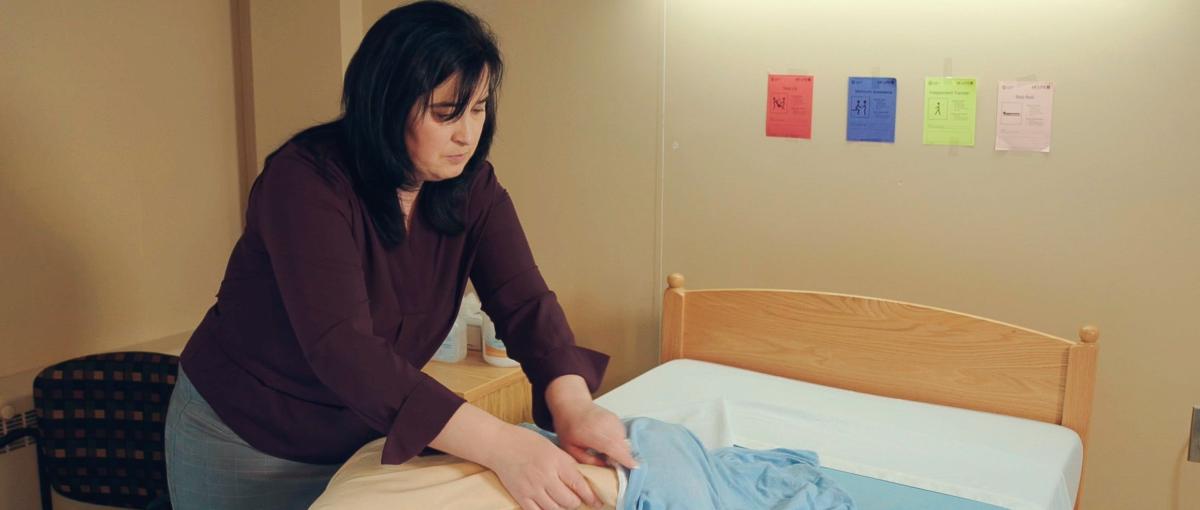Fostering family involvement in long-term care
Youville Home offers training videos for those who want to help a loved one

January 10, 2019
By Rey Rosales, Storytelling Advisor, Covenant Health
Judy Johnston decided to move her mom, Margaret Bagby, 98, to the Youville Home more than two years ago so she could be closer to her.
“I live in St. Albert and I had decided that I would make this next journey in her life with me by her side and still have a life of my own,” she says.
Judy, 72, visits her mom most days and likes the fact that she was given the opportunity to help care for her. “I decided to help in the evenings with feeding her dinner and getting her ready for bed,” she says. Her mom, who suffers from physical and cognitive challenges due to her advanced age, is very positive and a pleasure to be around, says Judy.
Judy is part of a growing number of family members who want to play an active role in caring for a loved one who lives in a nursing home or long-term care residence.
“This is a trend and also a cultural shift,” says Cecilia Marion, Senior Director at Youville Home and St. Joseph’s Auxiliary Hospital.
“Family members are used to taking care of their loved ones prior to moving them here. They want to continue to serve in some capacity and they think of the Youville Home as an extension of their home,” says Cecilia.
In response to requests from family members, Youville Home's team launched a family involvement initiative with the main objective of making sure that family members who want to help care for a loved one follow best practices to ensure a positive outcome and experience. The goals are to maintain the natural relationship that was there before the person moved into Youville Home and to ensure the person and their family are a complete member of the care team.
A steering committee and working groups were formed, which include volunteer members and staff, who spend significant personal time to ensure the project's a success, says Cecilia.
“This family involvement initiative is certainly driven from the ground up and it is a testament to the people’s commitment to care that’s provided here,” says Cecilia.
Currently, the initiative follows a two-track level of involvement: high-risk and low-to-medium risk (both risks apply to the residents, family member and staff helping with care).
Cecilia emphasizes that the high-risk involvement, such as helping with feeding (choking risk) and using a lift (injury risk), requires a family member to sign up as a volunteer. After signing up, they go through a security vetting and training process, similar to other volunteers.
On January 11, staff will launch a series of training videos. The pilot is designed to help train Youville Home family members on low-to-medium risks, such as assisting with morning care.
Five of the eight short videos are complete. Students from NAIT's Digital Media and IT (DMIT) program worked on the video production and editing. The whole family involvement initiative received funding support from the Sisters Legacy Foundation.
The videos will be piloted for a period of six months followed by a formal evaluation to determine whether they made a significant difference. If the outcome is positive then the initiative might also be tried in other facilities, says Cecilia.
As a family representative serving on the steering committee, Judy is happy to participate in the pilot.
“I am looking forward to learning some tips and tricks. I have learned mainly by watching the staff and listening to how they cue mom. There is lots to learn and I look forward to using the videos as a teaching aid,” she says.
Cecilia clarifies that not every family member opts to get involved with caring for a loved one. “At the outset, we present them with a care plan and we ask them about the type of involvement that they want to have in the care process.”
Cecilia notes that some of them just want to be a son or daughter when they come and visit. “Whatever involvement they want, we’re committed to providing a meaningful life experience for the person who moves into Youville Home and for family and friends to feel welcome and part of the care team.”